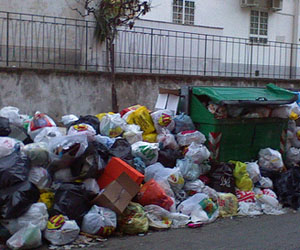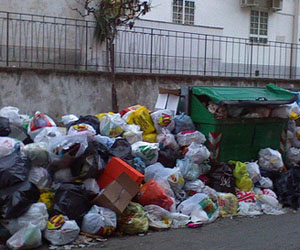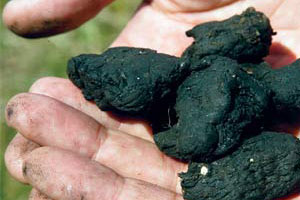
Photo used under a Creative Commons license by flickr user <a href="http://www.flickr.com/photos/22401862@N07/">conceptedge</a>
Part 1: In which our intrepid reporter sets off on a trash odyssey and learns that he’s been throwing out his garbage all wrong. [Read Part 2 and Part 3.]
Step 1: The Big Sort
In the best of ways, San Francisco is king of the trash heap. While the average American annually discards more than 1,100 pounds of garbage, the typical resident of the city by the bay trashes 882 pounds, thanks to a Herculean recycling program that recovers nearly half of everything that gets tossed. No major American city recycles more. I wanted to know why. It certainly wasn’t because of me.
To find out whether my city’s phenomenal recycling success was actually real, I asked San Francisco’s waste contractor, Sunset Scavenger, if I could track one week’s worth of my own trash in real time. It agreed, and so began my odyssey into a world of waste.
In addition to curbside pickup, Sunset Scavenger offers 11 other recycling services, everything from free “bulky item” pickup to a 16-year-old construction debris program that accounts for roughly 30 percent of everything the company recycles. These programs are supplemented by other independent recycling services that trade in everything from glass bottles to used asphalt. Factoring them all in, San Francisco calculates that 72 percent of its waste is diverted from the landfill. To reflect this focus on waste diversion, Sunset Scavenger’s parent company recently changed its name from Norcal Waste Systems to Recology.
Could other cities follow in San Francisco’s footsteps? Sunset Scavenger picks up recycling and compost for free but charges $24.75 per month to empty a large residential trash bin. That beats Los Angeles but not my previous hometown, anti-recycling Houston, where free garbage pickup (funded by local taxes) makes tossing things disturbingly easy. Sunset spokesman Robert Reed thinks his company’s rates are a bargain when weighed against the environmental costs of throwing out energy-intensive products and methane-spewing organic wastes. And he attributes the company’s success less to the collection rate it charges than San Franciscans’ stellar job of sorting their trash.
Not that I’d been obsessing over my garbage. Tall and lean with the short-cropped hair and intense stare of a drill sergeant, Reed informed me that I’d been living in the recycling Dark Ages. Though the recycling bins in my apartment building were still labeled “bottles and cans” and “paper and cardboard,” I no longer needed to sort things this way. Back in 2001, Sunset Scavenger switched to “single stream” recycling. Handling my recyclables had just gotten a lot easier, but I wondered if single stream was all it was cracked up to be.
Of course, the tradeoff for not parsing my cans and papers was that I was now strongly encouraged to separate out my food waste and put it in a compost bin. When I’d first called Reed, he’d berated me for not owning one. “About a quarter of the apartments in San Francisco have these,” he barked. “It’s kind of hard to do that story if you don’t have the green bin!” I felt like a kid who’d spent all night on the wrong homework assignment, though really, the decision not to order a green bin had been my landlord’s. I told Reed I’d convince him to have one delivered.
The night before my trash-tracking trek, I dumped the contents of my garbage can and recycling bin onto the kitchen floor to see what I’d be following: One bottle of “Two Buck Chuck” cabernet sauvignon, an unusually large paper egg carton, a Nine Whole Grain Crunch cereal box, and a couple of pounds of cat shit tied up in a Chinese take-out bag that said “Have a Nice Day.”
Imagining how Reed might further trash my recycling skills the next morning, I agonized over sorting. Should I recycle a piece of aluminum foil slathered in cherry pie filling? Or the junk-mail envelopes with plastic windows? Should I bother to fish out that plastic tub of skin cream that my wife had thrown away?
Step 2: Pickup Artists
At seven the next morning, Reed showed up outside my apartment in San Francisco’s Inner Richmond neighborhood. He opened my building’s big, black communal garbage bin and immediately spotted the plastic skin-cream container. I blamed my wife, but he’d already moved on to more contraband tossed by my neighbors. “Here’s a newspaper,” he said. Then he held up an envelope and proclaimed, “This is junk mail.” I noted its plastic window. “That’s okay, we can handle that,” he grunted, throwing everything into a recycling bin.
“You’ve got big garbage cans and a small green bin,” he said, sounding agitated. “Shouldn’t it be the other way? Shouldn’t you have small black, big green?” He grabbed a paint can out of the trash, mumbled “What the hell?” and began pulling wads of paint-covered masking tape out of it. Tossing the can into the recycling bin, he explained that any extra paint could be dropped off at the dump’s paint recycling center, which remixes it and donates it to communities in Zambia, Mali, and Tonga. Next, he unwrapped a clump of foil containing a half-eaten sausage and threw the foil in the recycling and sausage in the compost. I mentioned the cherry-pie-covered foil that I’d thrown away. “Just give it a little rinse,” he advised. “These are simple things. This isn’t rocket science.”
Reed went to wash his hands just as my garbage collector, Eric Pike, pulled up in his truck, which he calls the “Big Pig.” He wheeled my building’s recycling and trash bins up to its side, where a mechanical arm hoisted them up one by one and rattled out their contents. Chutes inside the truck routed the loads into two separate compartments.
Two dirty pillows jutted from one of the recycling bins next door. Pike fished them out with a hook, tossed them in the truck’s garbage compartment, and stuck a handwritten note on the bin that explained that pillows aren’t recyclable. “If there’s one thing I don’t like, it’s the bedding of other people,” he said. I asked about other annoyances. “Hypodermic needles, netting and hair, just stuff like that,” he said. One time an opossum jumped out of a can. “That scared the poo out of me.”
When Pike started his job 13 years ago, he’d scan the trash for anything of value. He took home CD players, most of which turned out to be broken, and once discovered $80 in cash. He eventually came to believe that garbage is garbage for a reason. These days, he said, “I try not to pay attention to the garbage too much. It just goes in the truck. My motto is, Get it done and go home.”













